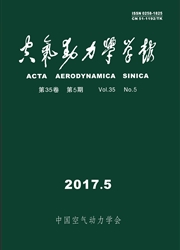

 中文摘要:
中文摘要:
神经网络模型的泛化能力是指模型对于新样本的适应能力,而当前基于神经网络的非线性气动力模型往往泛化能力不足。针对这一局限,发展了一种基于计算流体力学的带验证信号气动力降阶模型,用于跨声速气动力预测。采用递归径向基函数神经网络,通过引入差分进化算法,对模型中隐含层神经元宽度进行优化,优化目标为验证信号的均方根误差最小。训练信号采用结构大幅振荡的位移和气动力响应,用小扰动下微幅运动的信号作为验证信号。算例表明建立的降阶模型不仅具有比全阶数值模拟更短的计算时长,并且由于采用了小幅运动的验证信号,使模型在不同频率和振幅下的泛化能力得到增强。
 英文摘要:
英文摘要:
Generalization capability of neural network model names the prediction ability of the model to new input signal. However, current nonlinear aerodynamic models based on neural network usually lack such capability. To cover this shortage, a CFD based aerodynamic model using dif{erential evolution with validation signal is proposed and improved to predict transonic aerodynamic load. To minimize root mean square error of validation signal, the widths of neural centers in hidden layers are optimized by introducing differential evolution in this recursive radial basis function neural network. Training signal is large-amplitude displacement of that structural, while the validation signal is small-amplitude structural displacement. The results not only indicate the shorter calculating time of this reduced-order model than that of full-order numerical calculation, but a higher generalization capability of the model under various frequencies and amplitudes due to the introduction of small-amplitude validation signal.
 同期刊论文项目
同期刊论文项目
 同项目期刊论文
同项目期刊论文
 期刊信息
期刊信息
